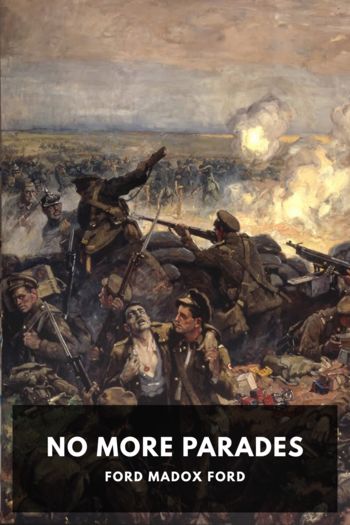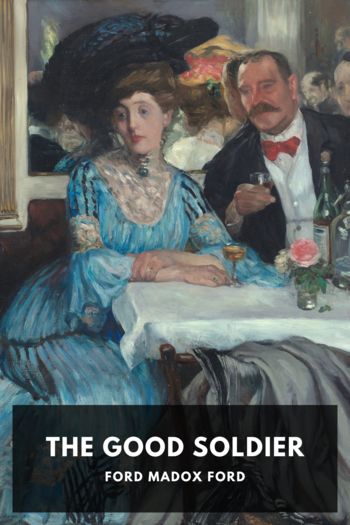Some Do Not … by Ford Madox Ford (story read aloud txt) 📕

- Author: Ford Madox Ford
Book online «Some Do Not … by Ford Madox Ford (story read aloud txt) 📕». Author Ford Madox Ford
“What does your wife think about it?”
Tietjens had answered:
“Oh, Mrs. Tietjens is a pro-German. … Or no, that isn’t exact. She has German prisoner-friends and looks after them. But she spends nearly all her time in retreat in a convent reading novels of before the war. She can’t bear the thought of physical suffering. I can’t blame her.”
Mrs. Wannop was no longer listening: her daughter was.
For Valentine Wannop the war had turned Tietjens into far more of a man and far less of an inclination—the war and Mrs. Duchemin between them. He had seemed to grow less infallible. A man with doubts is more of a man, with eyes, hands, the need for food and for buttons to be sewn on. She had actually tightened up a loose glove button for him.
One Friday afternoon at Macmaster’s she had had a long talk with him: the first she had had since the drive and the accident.
Ever since Macmaster had instituted his Friday afternoons—and that had been some time before the war—Valentine Wannop had accompanied Mrs. Duchemin to town by the morning train and back at night to the rectory. Valentine poured out the tea, Mrs. Duchemin drifting about the large book-lined room amongst the geniuses and superior journalists.
On this occasion—a November day of very chilly, wet—there had been next to nobody present, the preceding Friday having been unusually full. Macmaster and Mrs. Duchemin had taken a Mr. Spong, an architect, into the dining-room to inspect an unusually fine set of Piranesi’s Views of Rome that Tietjens had picked up somewhere and had given to Macmaster. A Mr. Jegg and a Mrs. Haviland were sitting close together in the far window-seat. They were talking in low tones. From time to time Mr. Jegg used the word “inhibition.” Tietjens rose from the fire-seat on which he had been sitting and came to her. He ordered her to bring her cup of tea over by the fire and talk to him. She obeyed. They sat side by side on the leather fire-seat that stood on polished brass rails, the fire warming their backs. He said:
“Well, Miss Wannop. What have you been doing?” and they drifted into talking of the war. You couldn’t not. She was astonished not to find him so loathesome as she had expected, for, just at that time, with the facts that were always being driven into her mind by the pacifist friends of her brother and with continual brooding over the morals of Mrs. Duchemin, she had an automatic feeling that all manly men were lust-filled devils, desiring nothing better than to stride over battlefields, stabbing the wounded with long daggers in frenzies of sadism. She knew that this view of Tietjens was wrong, but she cherished it.
She found him—as subconsciously she knew he was—astonishingly mild. She had too often watched him whilst he listened to her mother’s tirades against the Kaiser, not to know that. He did not raise his voice, he showed no emotion. He said at last:
“You and I are like two people …” He paused and began again more quickly: “Do you know these soap advertisement signs that read differently from several angles? As you come up to them you read ‘Monkey’s Soap’; if you look back when you’ve passed it’s ‘Needs no Rinsing.’ … You and I are standing at different angles and though we both look at the same thing we read different messages. Perhaps if we stood side by side we should see yet a third. … But I hope we respect each other. We’re both honest. I, at least, tremendously respect you and I hope you respect me.”
She kept silent. Behind their backs the fire rustled. Mr. Jegg, across the room, said: “The failure to coordinate …” and then dropped his voice.
Tietjens looked at her attentively.
“You don’t respect me?” he asked. She kept obstinately silent.
“I’d have liked you to have said it,” he repeated.
“Oh,” she cried out, “how can I respect you when there is all this suffering? So much pain! Such torture … I can’t sleep … Never … I haven’t slept a whole night since … Think of the immense spaces, stretching out under the night … I believe pain and fear must be worse at night. …” She knew she was crying out like that because her dread had come true. When he had said: “I’d have liked you to have said it,” using the past, he had said his valedictory. Her man, too, was going.
And she knew too: she had always known under her mind and now she confessed it: her agony had been, half of it, because one day he would say farewell to her: like that, with the inflection of a verb. As, just occasionally, using the word “we”—and perhaps without intention—he had let her know that he loved her.
Mr. Jegg drifted across from the window: Mrs. Haviland was already at the door.
“We’ll leave you to have your war talk out,” Mr. Jegg said. He added: “For myself, I believe it’s one’s sole duty to preserve the beauty of things that’s preservable. I can’t help saying that.”
She was alone with Tietjens and the quiet day. She said to herself:
“Now he must take me in his arms. He must. He must!” The deepest of her instincts came to the surface, from beneath layers of thought hardly known to her. She could feel his arms around her: she had in her nostrils the peculiar scent of his hair—like the scent of the skin of an apple, but very faint. “You must! You must!” she said to herself. There came back to her overpoweringly the memory of their drive together and the moment, the overwhelming moment, when, climbing out of the white fog into the blinding air, she had felt the impulse of his whole body towards her and the impulse of her whole body towards him. A sudden lapse: like the momentary dream when you fall. … She saw the white disk of the sun over the silver mist and behind them was





Comments (0)